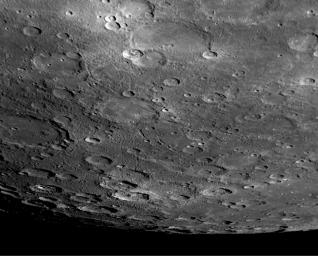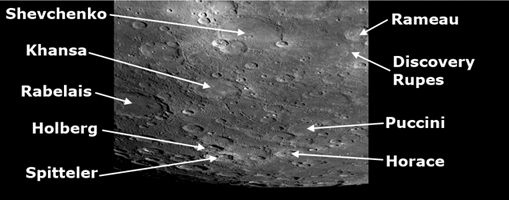
|
A View to the South…from the Other Side of Mercury
- Click the image above for a larger view
- Full-Res JPEG (1018 x 820) (135.2 kB)
- Full-Res TIFF (1018 x 820) (835.8 kB)
Caption:

Click on image for larger annotated version
MESSENGER's second Mercury flyby passed over the opposite side of the planet from that seen during the mission's first Mercury encounter. Thus, if one could follow this view obtained by the NAC during the second flyby toward the south, beyond Mercury's south pole, it would lead to the surface seen in an image from MESSENGER's first Mercury flyby ( PIA10187 ). Visible in the recently obtained image shown here are many features also seen by Mariner 10 : Shevchenko crater named for the 19th century Ukrainian poet, Khansa for the Arabic poet of the 7th century, Rabelais for the Renaissance French writer, Holberg for the Norwegian-Danish writer of the 18th century, Spitteler for the Swiss epic poet who won the Nobel Prize for Literature in 1919, Rameau for the Baroque-era French composer, Puccini for the Italian composer of the late 1800s and early 1900s, and Horace for the ancient Roman poet. Discovery Rupes cuts through Rameau and is named for the ship of English explorer Captain James Cook.
Date Acquired:
October 6, 2008
Image Mission Elapsed Time (MET):
131773823
Instrument:
Narrow Angle Camera (NAC) of the Mercury Dual Imaging System (MDIS)
Resolution:
510 meters/pixel (0.32 miles/pixel) at the top of the image
Scale:
Shevchenko crater is 137 kilometers (85 miles) in diameter
Spacecraft Altitude:
20,000 kilometers (12,400 miles)
Background Info:
These images are from MESSENGER, a NASA Discovery mission to conduct the first orbital study of the innermost planet, Mercury. For information regarding the use of images, see the MESSENGER image use policy .
Cataloging Keywords:
| Name | Value | Additional Values |
|---|---|---|
| Target | Mercury | |
| System | ||
| Target Type | Planet | |
| Mission | MESSENGER | Mariner |
| Instrument Host | MESSENGER | Mariner 10 |
| Host Type | Orbiter | Flyby Spacecraft |
| Instrument | Mercury Dual Imaging System (MDIS) | |
| Detector | Narrow Angle Camera (NAC) | |
| Extra Keywords | Crater, Grayscale | |
| Acquisition Date | ||
| Release Date | 2008-10-22 | |
| Date in Caption | 2008-10-06 | |
| Image Credit | NASA/Johns Hopkins University Applied Physics Laboratory/Carnegie Institution of Washington | |
| Source | photojournal.jpl.nasa.gov/catalog/PIA11374 | |
| Identifier | PIA11374 | |
